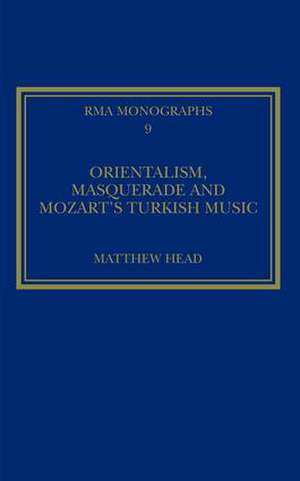Orientalism, Masquerade and Mozart's Turkish Music: Royal Musical Association Monographs
Autor Matthew Headen Limba Engleză Hardback – 28 noi 2000
Din seria Royal Musical Association Monographs
-
 Preț: 186.06 lei
Preț: 186.06 lei - 8%
 Preț: 389.10 lei
Preț: 389.10 lei -
 Preț: 193.27 lei
Preț: 193.27 lei -
 Preț: 137.74 lei
Preț: 137.74 lei - 26%
 Preț: 763.39 lei
Preț: 763.39 lei - 21%
 Preț: 245.48 lei
Preț: 245.48 lei - 17%
 Preț: 258.50 lei
Preț: 258.50 lei -
 Preț: 152.63 lei
Preț: 152.63 lei - 31%
 Preț: 762.16 lei
Preț: 762.16 lei - 20%
 Preț: 259.98 lei
Preț: 259.98 lei -
 Preț: 184.33 lei
Preț: 184.33 lei -
 Preț: 219.95 lei
Preț: 219.95 lei - 26%
 Preț: 706.51 lei
Preț: 706.51 lei - 23%
 Preț: 256.87 lei
Preț: 256.87 lei - 15%
 Preț: 255.27 lei
Preț: 255.27 lei -
 Preț: 378.92 lei
Preț: 378.92 lei -
 Preț: 155.44 lei
Preț: 155.44 lei - 16%
 Preț: 234.90 lei
Preț: 234.90 lei - 25%
 Preț: 497.37 lei
Preț: 497.37 lei - 26%
 Preț: 494.92 lei
Preț: 494.92 lei - 26%
 Preț: 761.34 lei
Preț: 761.34 lei - 17%
 Preț: 259.98 lei
Preț: 259.98 lei - 23%
 Preț: 257.28 lei
Preț: 257.28 lei - 15%
 Preț: 256.87 lei
Preț: 256.87 lei - 17%
 Preț: 238.67 lei
Preț: 238.67 lei - 15%
 Preț: 257.68 lei
Preț: 257.68 lei - 17%
 Preț: 259.98 lei
Preț: 259.98 lei - 31%
 Preț: 762.81 lei
Preț: 762.81 lei - 26%
 Preț: 763.39 lei
Preț: 763.39 lei - 25%
 Preț: 495.72 lei
Preț: 495.72 lei - 16%
 Preț: 234.90 lei
Preț: 234.90 lei - 8%
 Preț: 387.08 lei
Preț: 387.08 lei - 31%
 Preț: 764.20 lei
Preț: 764.20 lei - 31%
 Preț: 765.59 lei
Preț: 765.59 lei
Preț: 734.57 lei
Preț vechi: 1026.36 lei
-28% Nou
Puncte Express: 1102
Preț estimativ în valută:
140.56€ • 150.31$ • 117.20£
140.56€ • 150.31$ • 117.20£
Comandă specială
Livrare economică 27 martie-10 aprilie
Doresc să fiu notificat când acest titlu va fi disponibil:
Se trimite...
Preluare comenzi: 021 569.72.76
Specificații
ISBN-13: 9780947854089
ISBN-10: 0947854088
Pagini: 156
Dimensiuni: 1 x 1 mm
Greutate: 0.35 kg
Ediția:1
Editura: Taylor & Francis
Colecția Routledge
Seria Royal Musical Association Monographs
Locul publicării:Oxford, United Kingdom
ISBN-10: 0947854088
Pagini: 156
Dimensiuni: 1 x 1 mm
Greutate: 0.35 kg
Ediția:1
Editura: Taylor & Francis
Colecția Routledge
Seria Royal Musical Association Monographs
Locul publicării:Oxford, United Kingdom
Cuprins
Acknowledgements, List of Music Examples, Introduction Mozart's Orientalism, Osmin's Rage, 1. Orientalism, History, and Theatre, 2. Mozart's Orientalism: Scope and Contexts, 3. A Copy of a Copy: Mozart's Sources, 4. Turkish Music, Masquerade, and Self-Othering, 5. Emplotting Turkish Music: Sonata in A (K. 331 / 300i), 6. Mozart Imperialisms, Sources Cited, Index
Descriere
Matthew Head explores the cultural meanings of Mozart's Turkish music in the composer's 18th-century context, in subsequent discourses of Mozart's significance for 'Western' culture, and in today's (not entirely) post-colonial world. Unpacking the ideological content of Mozart's numerous representations of Turkey and Turkish music, Head locates the composer's exoticisms in shifting power relations between the Austrian and Ottoman Empires, and in an emerging orientalist project. At the same time, Head complicates a presentist post-colonial critique by exploring commercial stimuli to Mozart's turquerie, and by embedding the composer's orientalism in practices of self-disguise epitomised by masquerade and carnival. In this context, Mozart's Turkish music offered fleeting liberation from official and proscribed identities of the bourgeois Enlightenment.
